FSFE 2012 Annual Report
Come and see what FSFE did in 2012! Read our annual report to find out what we achieved, how we did it, and what's ahead for 2013. We thank all of our Fellows, donors and sponsors for making our work possible! If you like what you see, please remember to sign up as a supporter, so we can keep you updated.
Why we work for software freedom
With every day, computers become a bigger part of our lives. Our phone is a computer that we carry in our pocket. Cars, as Cory Doctorow says, are just computers that we drive around in. Computers in every shape and form have become central building blocks of our civilisation.
Who controls these computers? If they are black boxes that keep their internal workings secret from us, if their makers have artificially restricted them to limit what we can do with them, then although we may pay for these computers -- we can never own them.
In order to be in charge of our own lives, we need to be able to control the computers we use. We can only do this if they run Free Software that we can use, study, share and improve. We can only do this if our computers aren't neutered to restrict their functionality, or loaded with spyware. We also need neutral networks to connect them to, so we can freely choose what to say, and to whom.
With this in mind, 2012 was both a good and a bad year for our freedom. Android is an example of how ambiguous things can get. More than 500 million smartphones and tablets with the Free Software operating system have been sold so far, putting Free Software in the hands of more people than ever before. But this is also an operating system that sometimes limits what users can do with their phones, and invites users to hand away private data. This is why we launched the Free Your Android campaign to help empower citizens to take full control of their mobile devices.
These new challenges are the latest in a series of long-standing problems that we have been working on for years. Governments and the public sector should be a natural customer base for Free Software companies and developers. Yet, public bodies across Europe remain stuck in the stranglehold of proprietary software vendors. We have continued to work on fixing government procurement and wider Free Software policies, whether in Brussels, London, Berlin or Helsinki.
We are proud to give the Free Software movement a voice in politics, and policy makers increasingly turn to FSFE for expertise and input. We helped the UK government shape its new Open Standards policy, and advised the German parliament on Free Software issues.
We worked hard to get the Free Software message out. During 2012, FSFE staff and Fellows gave more than 50 talks at events across Europe. At many of these events, we also set up a booth where people could easily find us to talk about Free Software, ask for help, and learn about our work. In addition, we held more than 15 meetings, hackathons and workshops in countries such as Finland, the UK, Estonia and Austria. The lawyers and engineers in the Legal Network which we facilitate brought the latest in Free Software thinking to their companies and clients.
Thanks to all this work, and that of the many groups and individuals with whom we join forces, the world is slowly changing. Every day, more people wake up to the power of cooperation and sharing. Every day, more people expect freedom by default.
Please join us, and help us get the world to live up to these expectations. With your support we can do it. Thank you for making our work possible!
Karsten Gerloff, President, Free Software Foundation Europe
What we have achieved in 2012
The new frontline: General purpose computing
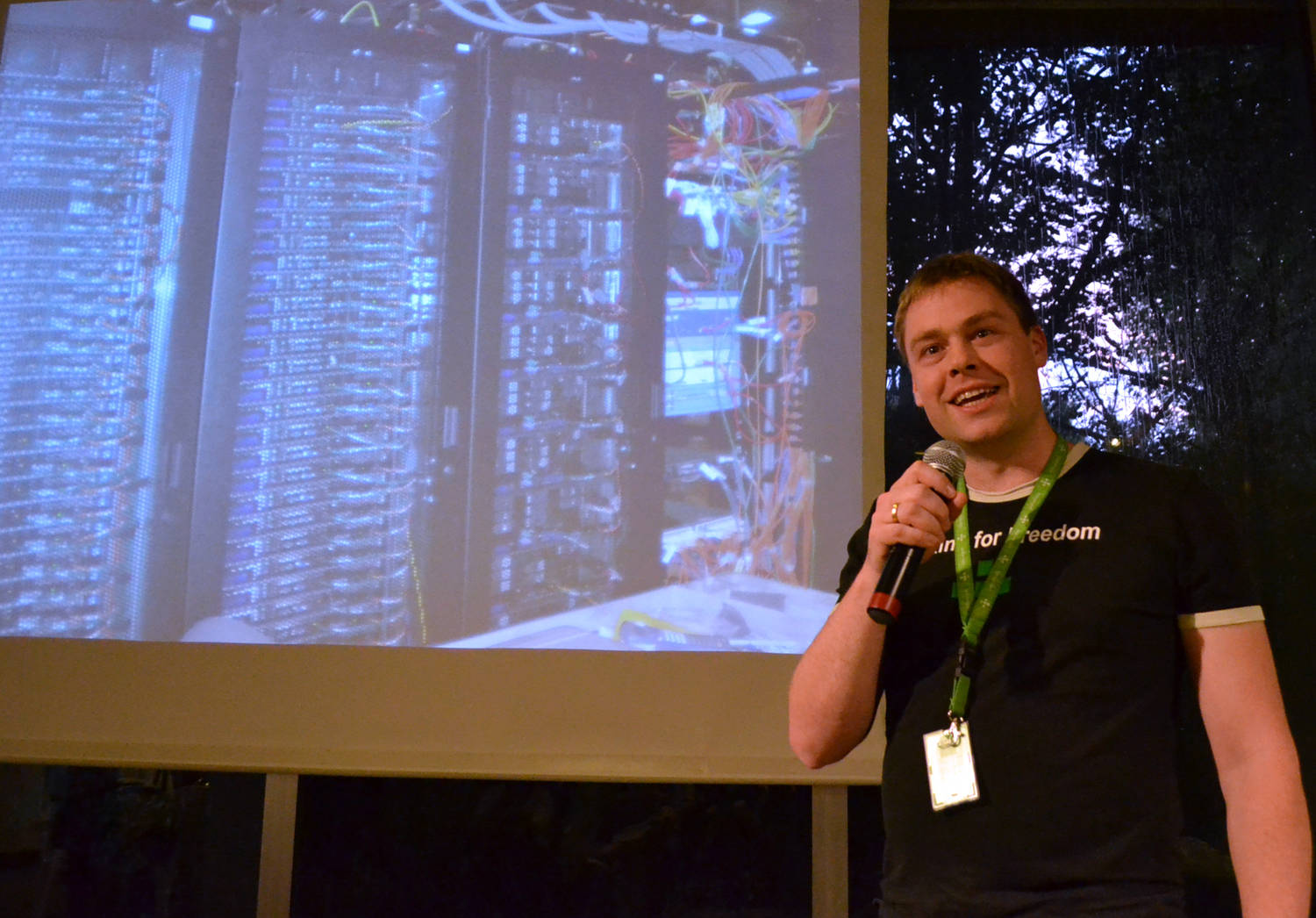
Karsten Gerloff talking about software freedom
The Internet and computers in all their forms have become an essential part of modern civilisation. They have deeply changed the way we live, work, create, and dream. The technological progress we have seen over the past couple of decades was only possible because of general purpose computers -- computers that will perform any task we give them, and networks that don't care what kind of data we transmit through them, as our president Karsten explained in his talk called All watched over by machines of loving grace?".
But this freedom to make our computers do anything we can imagine is under threat. Locked-down devices are everywhere, from the iPhone to "smart" TVs and game consoles. If we let this trend continue, the only freedom we will enjoy in a few years will be the freedom to choose our masters.
So we have made general purpose computing a focus topic for our work. We want you to be in full control of the technology you use. The limit for your ideas should be the boundaries of your imagination, not some marketing department's plan to take more money from of you.
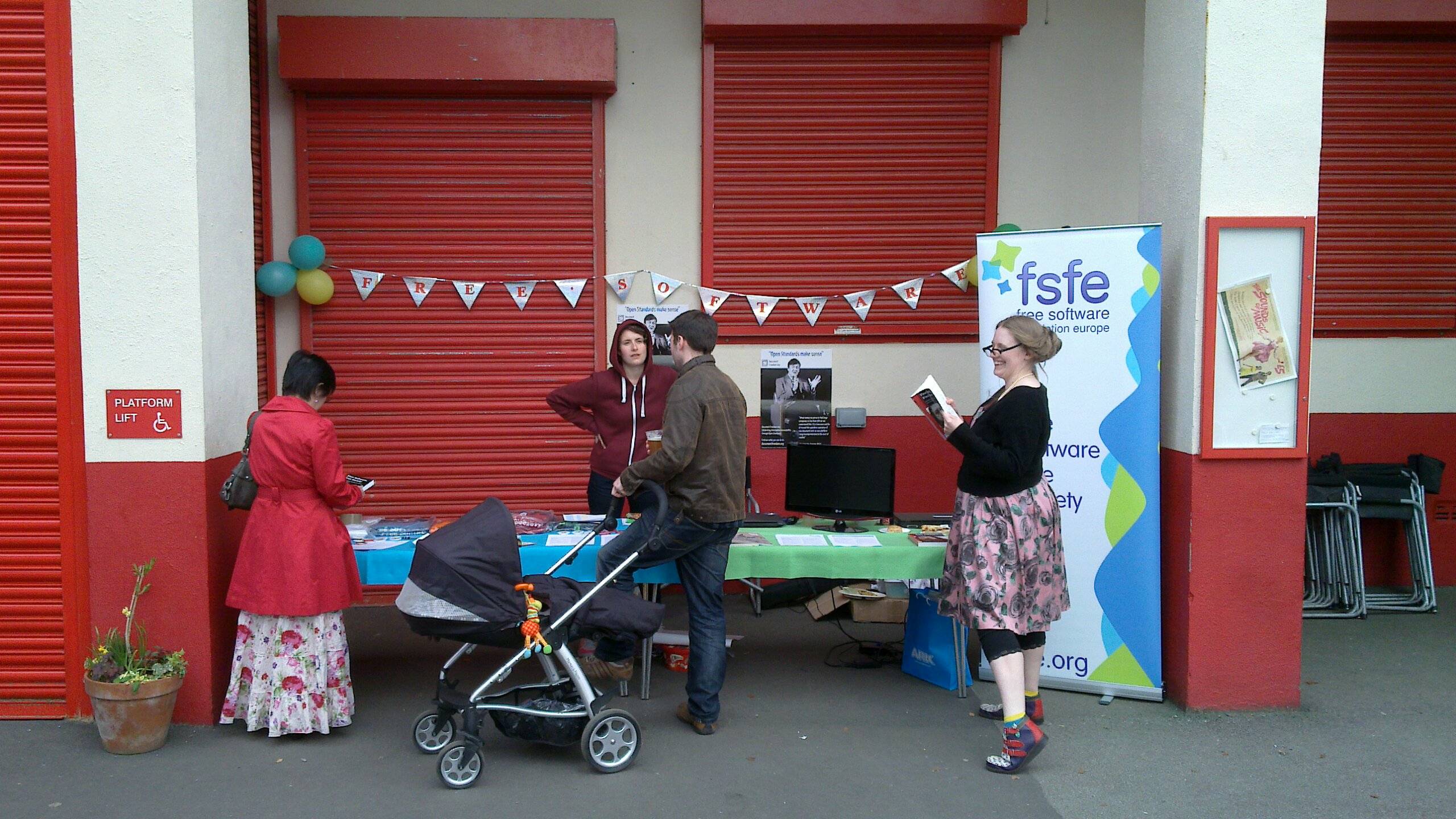
FSFE booth in Manchester
Take charge of your phone
We decided to start as close to the people as possible: in their pockets. Your mobile phone is the most personal of your devices. It knows who you talk to, where you are, and what your plans are. So it is important that you have full control over what it does.
That is where our Free Your Android campaign comes in. We organise workshops to help people install operating systems on their phones that don't tie them to a particular company or service provider, and respect their privacy. At the end of the day participants don't just have a better phone, but something even more important: The knowledge that they can truly control the technology they use.
Torsten Grote, a former Fellowship representative, and new staffer Erik Albers have run or supported nine workshops since August, from Spain and Sweden through Germany and Italy to Slovenia and Kosovo, with over 100 participants. Get in touch if you would like to become a trainer and/or organise a workshop near you.
Your freedom to install Free Software
If you cannot install whatever software you choose on a computer, you don't really own it. Many PCs and mobile devices that went on sale from late 2012 come with a mechanism called "SecureBoot" ("Restricted Boot" would be a more appropriate name) that would prevent you from doing exactly that. We accompanied this process, and have made our demands clear: Device owners must have complete and sole control of their devices. This and other demands were echoed in a white paper by Germany's federal government. We will continue to raise this issue with politicians, consumer protection groups and anyone else who can help us defend your freedom.
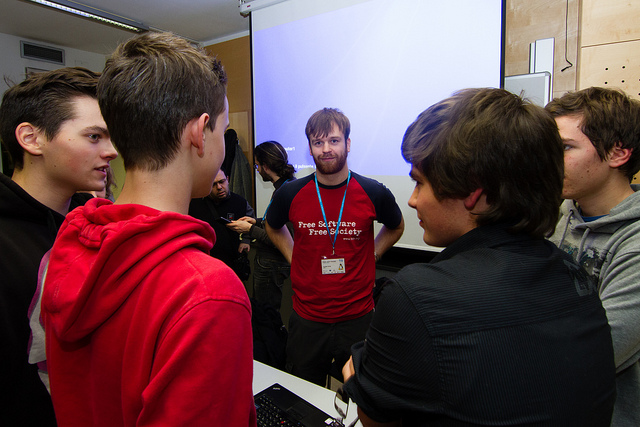
Torsten Grote at a Free Your Android workshop
We also overhauled our drm.info website with fresh information about digital restrictions management (DRM). Fellow Anna Morris and our campaign manager Sam Tuke both spoke to the BBC: Anna about a conference for women in Free Software that she helped to organise and Sam about teaching kids how to program.
Unlock digital handcuffs - use Open Standards
This year's Document Freedom Day was the most successful yet of our annual campaigns for Open Standards. Volunteers organised 54 events in 23 countries. Proprietary file formats are like digital handcuffs -- so we sent out 100 info packages to politicians and public figures, each containing a letter and a set of handcuffs.
Among the recipients were Pope Benedict XVI. and EU Commissioner Neelie Kroes, who liked the idea so much that she took the handcuffs along for one of her speeches.
Making the rules
We give the Free Software movement a voice in politics. We push for rules that are good for software freedom, and work to get rid of those that are bad for Free Software.
In May, the European Court of Justice ordered Microsoft to finally pay a record fine of 860 million euros for using its near-monopoly on the desktop to keep rivals out of the workgroup server market. Microsoft had previously spent over three billion Euro to buy third parties out of the case. We stayed on the case for almost a decade, and asserted the rights of Free Software developers to access interoperability information, especially for the Samba Team. Samba is a Free Software system for sharing files and printers that is a competitor to Microsoft's proprietary products. The court eventually agreed with us: Receiving the interoperability information was a right of the Free Software community, not a concession by Microsoft.
The European Parliament adopted an ill-conceived compromise for a single European patent system, opening the door for even more patents on software to be granted and enforced. In the years ahead, we will work hard to protect the Free Software community from the negative consequences of this decision.
For almost two years, we worked with the UK government to help them build a strong Open Standards policy. We were succesful: the government in November published a new policy on Open Standards and introduced some fundamental changes to the way the government buys software. The country's government bodies are now required to prefer Open Standards, and have to figure exit costs into the price of any new solution they buy.
The German parliament asked Matthias Kirschner, our German team coordinator, to participate in its experts' commission on Free Software. He did a great job of speaking up for the Free Software movement. We're expecting the group's recommendations to be published in early 2013.
Our Finland coordinator Otto Kekäläinen together with lawyer Martin van Willebrandt monitored calls for tender in Finland to see if they mentioned brand names, and took Helsinki's city government to tas for a botched OpenOffice pilot project. In November, Otto received the Nordic Free Software Award in recognition of the great job he's been doing.
In other countries, too, government procurement was a hot issue this year. We helped the Basque Country in Spain to make a rule that programs developed with public funds should be published as Free Software. The governments of Italy and France told their public bodies to prefer Free Software.
Our general counsel Carlo Piana and president Karsten Gerloff helped the European Parliament to release some Free Software of its own, and answered legal and practical questions from the Parliament's IT team.
The software should become available by mid-2013. At the same time, we warned the Parliament's administration that they were compromising staff politically by offering them gratis licenses to proprietary software.
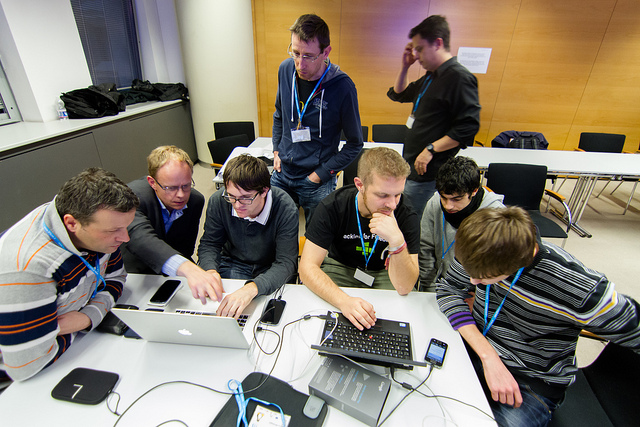
Supporting developers with legal expertise
Our legal team helped more than 60 Free Software developers and projects to resolve licensing questions and other legal problems. In three "Hacking for Compliance" workshops, we trained volunteers to analyse and report embedded devices for GPL violations, so that the gpl-violations.org project could pursue them. Our General Counsel Carlo Piana and Legal Coordinator Matija Šuklje supported the Free Your Android campaign by making it clear that flashing your phone does not void your warranty.
The international Legal Network which we facilitate continues to be the premier place for Free Software legal experts to meet and exchange views. The annual Free Software Legal and Licensing workshop, organised by FSFE's Legal Team, attracted more than 60 lawyers, developers and engineers. In two days of discussing compliance, governance and patents, they contributed to a better understanding of how companies and community groups can use Free Software to their advantage.
Who is doing all the work
FSFE's General Assembly decides on our strategy and oversees our work. We welcomed two new members this year, bringing the total to 17. Martin Gollowitzer is a long-term volunteer from Austria who has consistently worked on the Fellowship. Nikos Roussos from Greece was elected to serve a two-year term as a Fellowship representative alongside Hugo Roy from France.
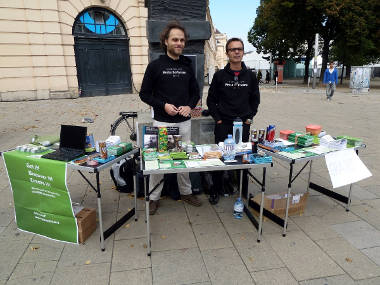
Software Freedom Day action in Vienna
After Erik joined the team in October to support volunteers' activities throughout Europe, FSFE now has seven people on staff. Four of these work full time, three part time. In addition, we had a number of great interns this year, who made important contributions to our work. Some of them have taken on responsibility coordinating volunteers, such as Alessandro Polvani with the Italian team and Eszter Bako with our policy team. We have a great set of interns lined up for 2013, and are already looking forward to hosting them.
We couldn't have achieved the impact we made in 2012 without our Fellows and volunteers. Many people contributed, each person with their own special skills, for example as developers, system administrators, or legal experts. The translators team helps us to spread the word about Free Software across Europe and the world, by translating our website into up to 30 languages.
Challenges for 2013 and beyond
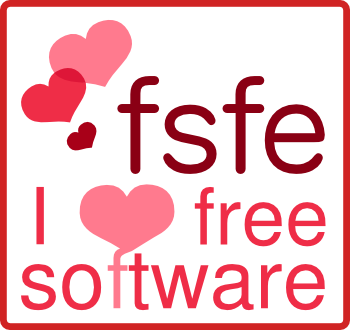
On Valentine's Day, spread the love
Gaining broad acceptance for Free Software was only the start. For 2013, we all face some important challenges:
- Software patents: After the EU has reached a compromise on the unitary patent, there is a risk that software patents will increasingly be asserted against European companies. FSFE will monitor the unitary patent system as it develops and speak up for the interests of those working with Free Software.
- Lockdown:The flood of innovation based on the PC and the Internet was made possible by general-purpose computers and neutral networks. Today, device makers and network operators increasingly strangle innovation by artificially restricting devices and networks. FSFE builds awareness for the importance of general purpose computing, and enables people to take innovation into their own hands again.
- Public procurement:The public sector stands to benefit hugely from Free Software, but outdated procurement practices stand in the way. Working with public bodies, companies and regulators, FSFE explains how procurement practices must change, creating opportunities for Free Software companies along the way.
- Brand abuse: For many buyers of software and services Free Software has come to stand for great software and great value. Some companies are mislabeling their software to take advantage, promising the user freedoms that they do not deliver. FSFE will help users make informed choices to preserve their freedom.
Support FSFE
We ask you to help us tackle these challenges head-on. FSFE is financed through your donations. As an individual, pleasejoin the Fellowship. As a company, please donate to FSFE. Join the many individuals and companies who support our work, and help keep us independent. Together, we can build a better society for all.
Donations to FSFE are tax-deductible in Germany, Switzerland and the Netherlands. Less than 20% of our budget is spent on overhead costs, and we are looking to further reduce this figure as we grow and existing structures scale up.